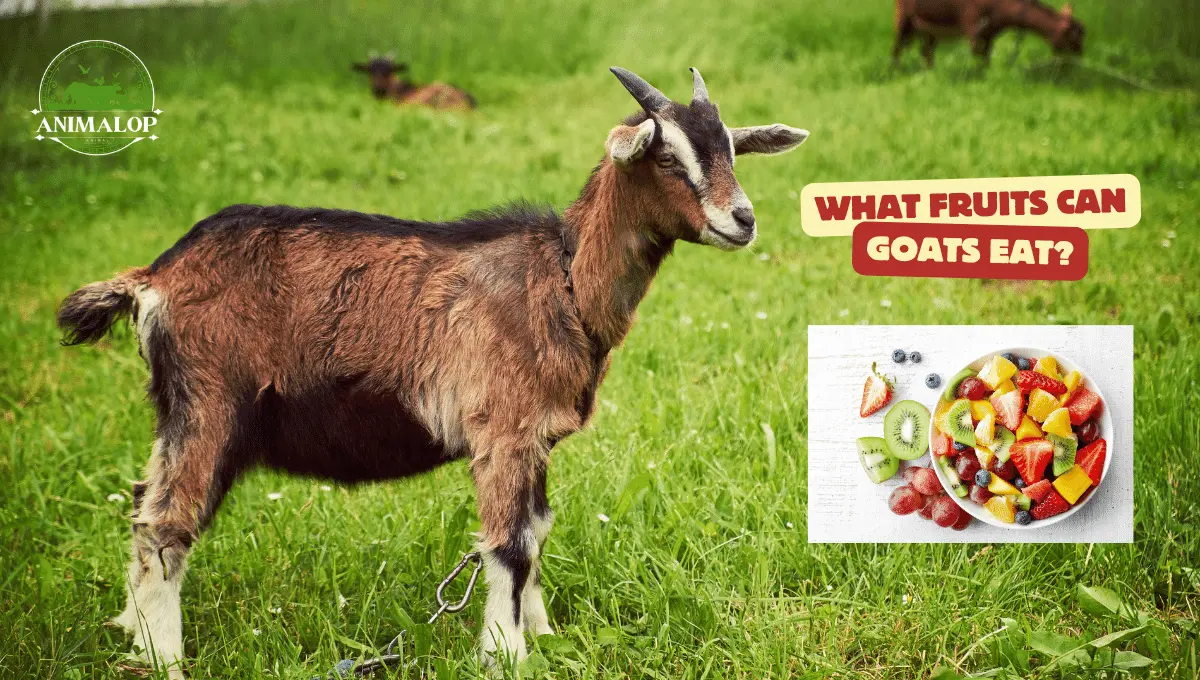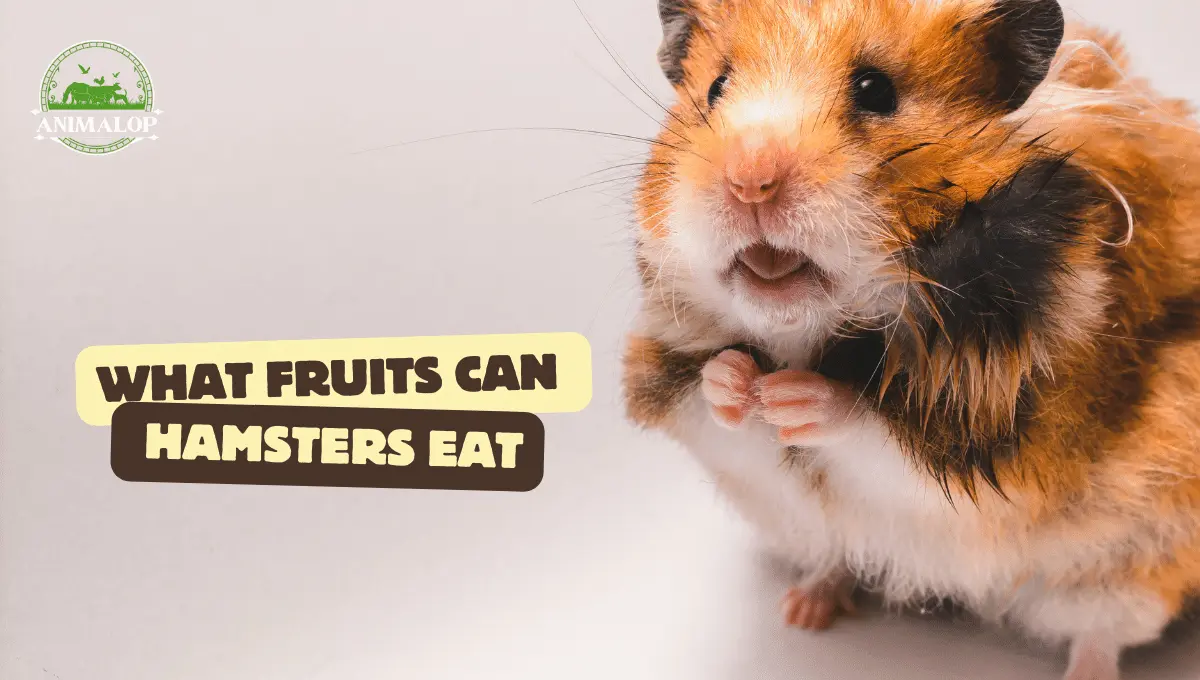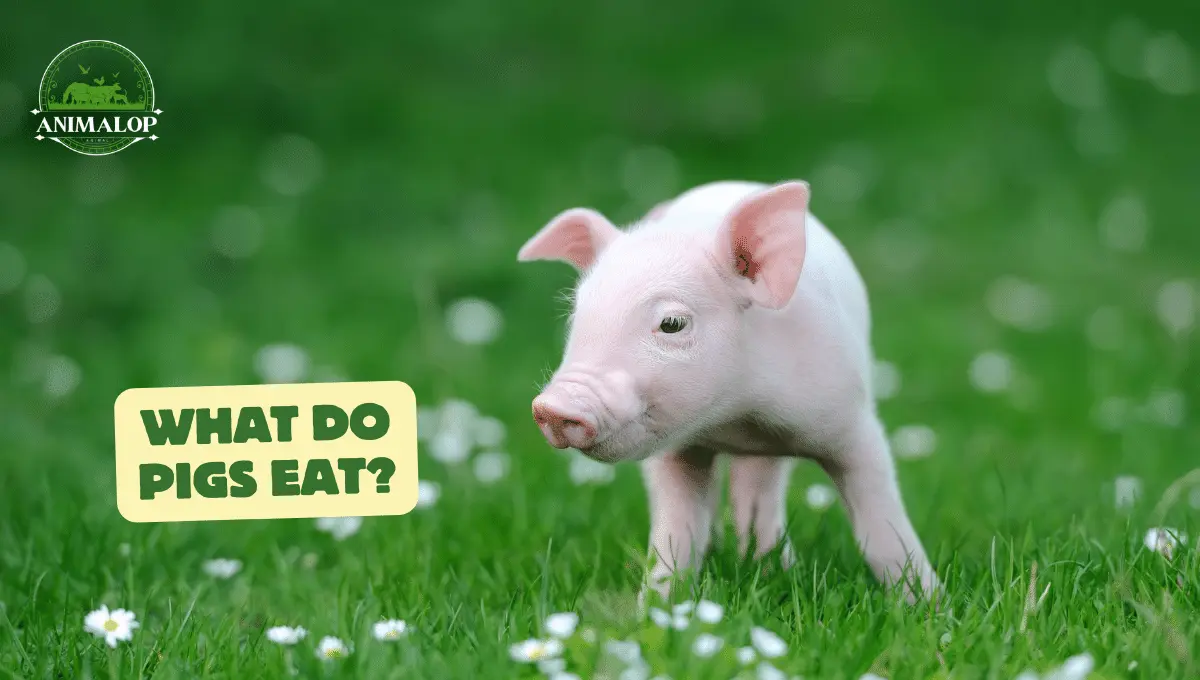Goats can eat lots of different things, like leaves, hay, and fruit. But can they eat all kinds of fruit? What fruits are safe for goats to eat? Are there any fruits you ought to avoid giving them?
Some fruits and vegetables aren’t good for goats. You should avoid feeding them nightshades like tomatoes and eggplants, alliums like garlic and onions, and citrus fruits because they can mess up the goat’s stomach acidity.
However, there are many safe and healthy options to give in moderation, like apples, bananas, strawberries, carrots, and watermelon. While these snacks provide some vitamins and minerals, they don’t have everything a goat needs nutritionally.
Can Goats Eat Lettuce?
Yes, goats can safely eat lettuce. There are different types of lettuce you can give your goats as a treat. Just make sure lettuce doesn’t make up more than 20% of their diet.
Lettuce is full of nutrients like fiber, water, and several vitamins that are good for goats. You can give it to them by itself or mix it with other veggies like broccoli, asparagus, celery, or tomatoes to make a more balanced snack.
Check out the feeding guide of bunnies in detail.
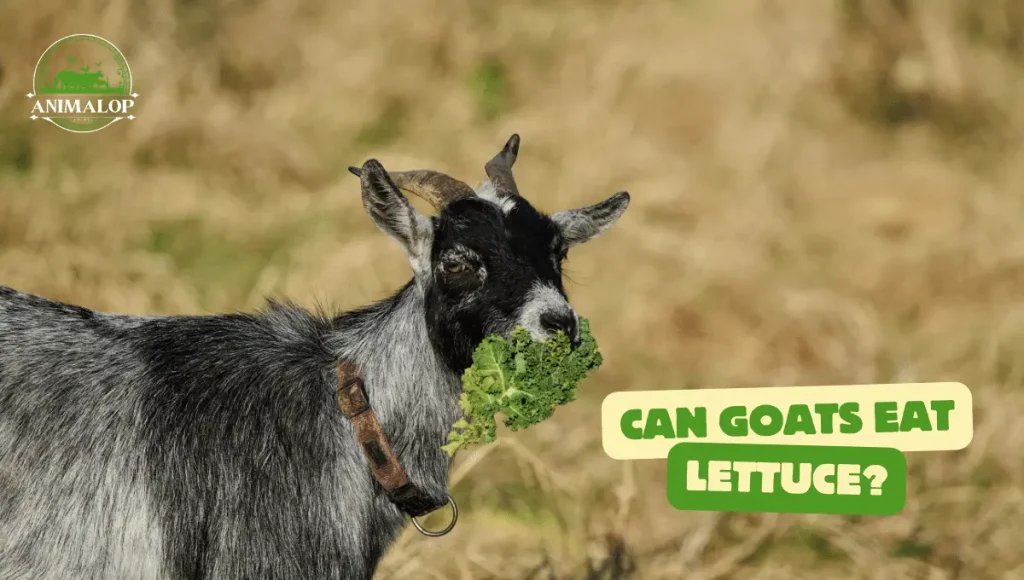
Health Benefits
- Lettuce isn’t just healthy for us, it’s also good for goats. They need a mix of vitamins and minerals just like we do. Although goats mainly get their nutrients from forage, hay, and grain, snacks should also offer some nutrition.
- Lettuce has lots of important minerals and vitamins. Even iceberg lettuce, which is often seen as having lower nutritional value, contains vitamins A, C, and K, and key minerals like potassium, folate, and iron.
- Darker lettuces are even better for goats. For example, red leaf lettuce is more nutritious than plain green lettuce, and romaine has more vitamins and minerals than iceberg. These nutrients are required for the health of young goats and for pregnant or nursing.
Can Goats Eat Grapes?
It’s a common myth that goats can eat anything they find. While it’s true they eat a variety of things, not everything is good for them. However, goats do enjoy healthy snacks.
Grapes are a great choice for goats. They can eat the flesh, seeds, and even the vines of grapes. Most goats prefer sweeter grapes over tart ones.
Often, goats don’t chew grape seeds, so these seeds just pass through and end up in their manure without being digested.
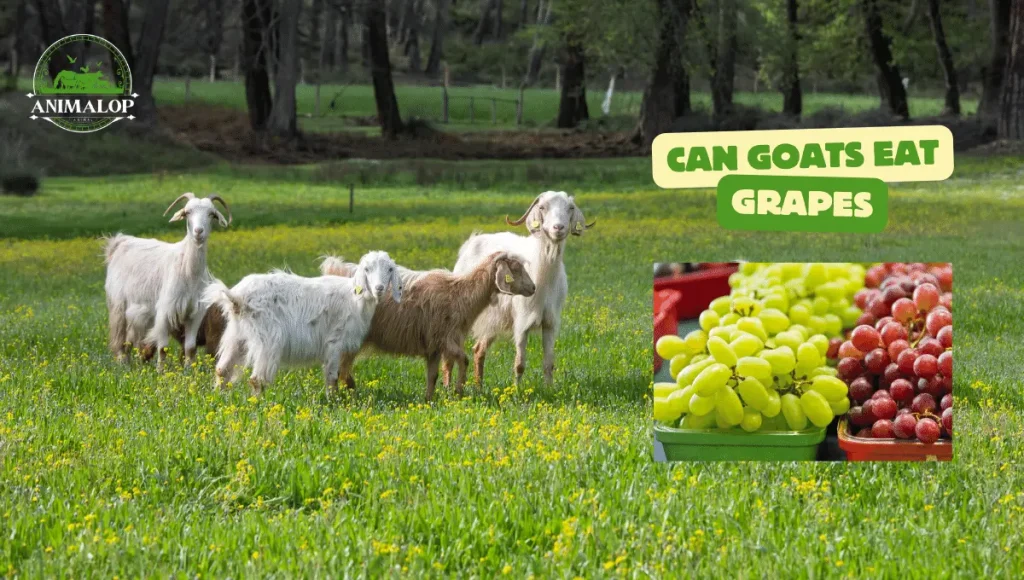
Mixing grapes with hay can be a good feeding option for goats.
Health Benefits
- Grapes are full of vitamins K and C, which are important for the health of connective tissues.
- The seeds and skins of grapes are rich in substances that help fight off disease.
- Grapes can also protect a goat’s eyes from certain types of light damage because they contain lutein and zeaxanthin.
- Eating grapes can improve a goat’s memory and attention.
- Grapes might help prevent long-term health issues because they reduce swelling in the body due to a substance called resveratrol.
Can Goats Eat Potatoes?
Yes, goats can eat potatoes, but they need to be cooked first. They can handle a little raw potato, but it’s not recommended because it could upset their stomach.
This means it’s fine to give your goat some plain mashed potatoes. However, you should never feed your goat green potatoes because they contain a harmful toxin called solanine.
Explore what to provide as treat snacks to goats.
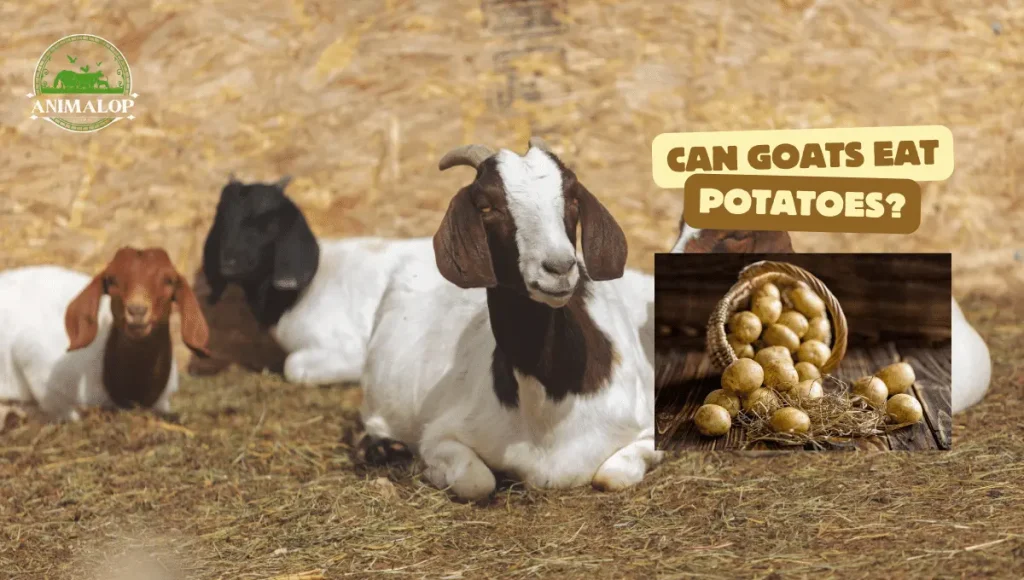
Health Benefits
- Potatoes have a few risks, but they also offer many benefits to goats.
- They are vegetables low in carbs and packed with vitamins and minerals.
- Potatoes mainly have vitamin C, vitamin B6, and potassium. They also have smaller amounts of manganese, magnesium, and phosphorus. A lot of these minerals and vitamins are also in the potato skin.
- Vitamin C is good for the growth, repair, and development of tissues and helps goats absorb iron and fight off illness.
- Vitamin B6 supports brain health, reduces heart disease risk, and improves eyesight.
- Potassium helps control fluid levels in the body and benefits goats by lowering blood pressure, strengthening bones, and preventing muscle loss.
- Magnesium is crucial for many body reactions, helping to boost energy, enhance muscle movement, and lower blood pressure.
- Phosphorus is best for getting rid of waste and repairing cells and tissues. It’s essential for strong bones and maintaining energy.
- Potatoes are also high in antioxidants such as flavonoids and carotenoids, which are useful for heart health.
- The way you prepare potatoes also affects their nutritional value. For example, frying potatoes count more calories and fat compared to baking them.
Can Goats Eat Banana Peels?
Yes, goats could safely eat bananas, along with the peels. Bananas are packed with important vitamins like vitamin C and B vitamins, but they should be given in moderation because they’re quite sugary.
Too much sugar can make a goat gain weight and might cause other health issues. Some goats might even start to crave sweet things more if they get used to the sugar!
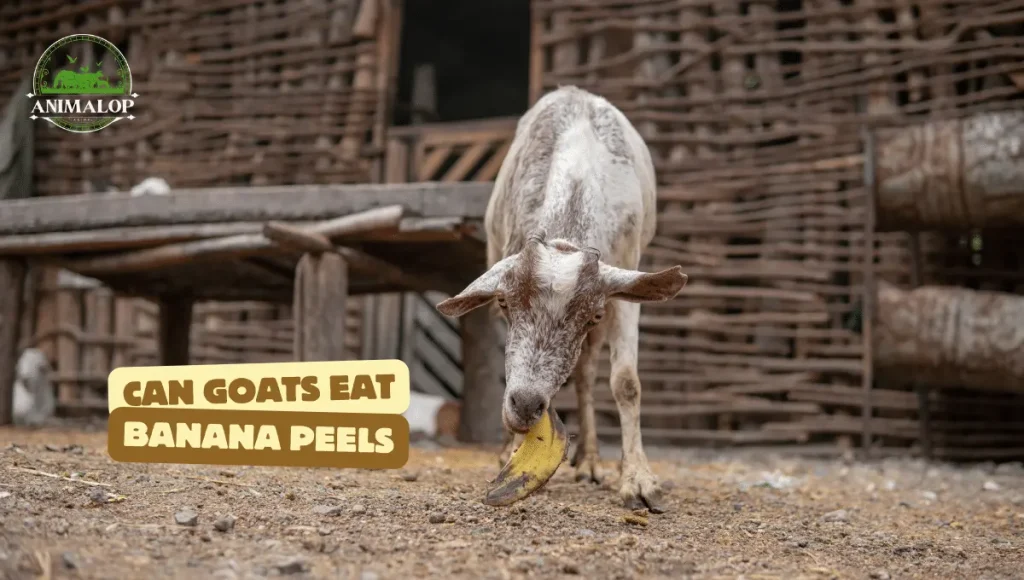
Goats really enjoy bananas, so you’ll need to control how much they eat. If you’re in a place where bananas grow naturally, like where I live, you might find that goats will eat all the bananas they can get. It might be a good idea to fence off your banana plants to keep the goats from eating them all.
Also Read: What vegetables do chickens love to eat?
Benefits of Bananas
- Bananas aren’t just tasty; they’re also very nutritious and can give goats a nice health boost.
- Bananas are full of B vitamins like B1, B2, B3, B5, and especially B6, along with folate. They also contain choline and plenty of vitamin C.
- Their mineral content is well-rounded too, with lots of magnesium, manganese, and potassium, and some iron, phosphorus, and zinc.
- The B vitamins in bananas help with metabolism, keeping the nervous system working right, and maintaining healthy skin and coat in goats.
- Plus, they are a rich source of many minerals and vitamins. They have a lot of B vitamins and a good amount of vitamin C. They also contain important minerals like copper, potassium, and magnesium, which are crucial for your goat’s health.
- Moreover, bananas are also high in fiber, which is important for proper digestion. Feeding your goats bananas instead of other less nutritious snacks can help keep their digestive system running smoothly and make them feel fuller.
Can Goats Eat Pineapple?
Yes, goats can eat pineapple, but only as an occasional treat because it’s high in sugar. Pineapple is packed with nutrients important for growth and staying healthy, but too much sugar can lead to obesity and stomach problems, so it’s important to give it to them in moderation.
Pineapples have a lot of good stuff like fiber, water, sugars, and acids like citric and malic acid, along with potassium, vitamin C, calcium, magnesium, and thiamin.
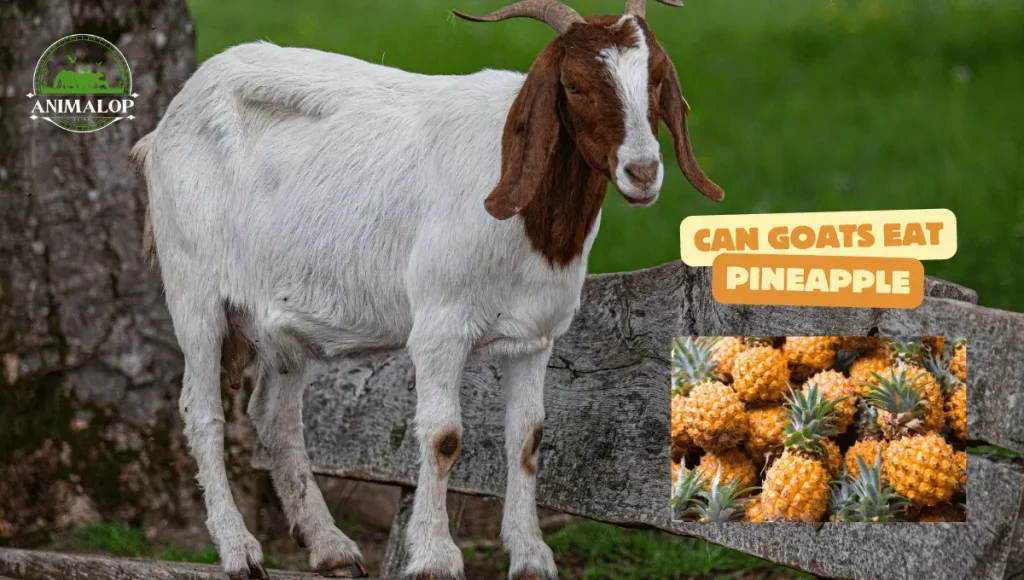
These nutrients help goats develop well and stay strong. Pineapple also has enzymes that aid in digestion and it’s a good source of vitamin C. However, you should introduce it slowly to your goat’s diet, as sudden changes can upset their stomachs. Goats naturally like to eat plant material they find around them.
Health Benefits
- Vitamin A is crucial in a goat’s diet as it supports their skin health and vision, helps them fight infections, and maintains their reproductive health. Not getting enough Vitamin A can cause problems like eye tearing and diarrhea.
- Vitamin E is also important, acting as an antioxidant. Young goats especially need it to avoid muscle diseases, while adult goats need it for good reproductive health and a strong immune system.
- Including pineapple in a goat’s diet is helpful because it’s about 87% water, which helps them stay hydrated.
- Pineapple also has a good amount of fat, which goats use for energy. However, be mindful of how much fat they get, as too much can interfere with how they digest fiber.
Can Goats Eat Oranges?
Yes, goats can eat oranges and even peels. Oranges are a nutritious and safe snack for goats.
Your goats probably won’t find oranges while they’re out grazing unless you live in a warm area with orange trees around. Even so, buying oranges to treat your goats every now and then is a good idea. Goats usually love the sweet and juicy flavor of oranges.
However, like with any treat, you have to control how much they eat. Too many treats can upset a goat’s stomach. If your goat eats leaves from your orange tree, don’t worry. Orange trees are safe for goats, unlike some other plants that can be toxic.

Health Benefits
Oranges come with vitamins that can help keep your goat healthy in the right amounts. They contain Vitamin A, which boosts the immune system, and Vitamin E, which promotes overall health.
Oranges are famously rich in Vitamin C, an antioxidant that aids in expelling harmful substances from the body.
Oranges also provide fiber and folate acids that support cell division, calcium for strong bones, and potassium, which is good for heart and muscle functions.
The orange peel has the most vitamins, so if your goats eat the peel, it’s a great way for them to get extra nutrients.
If it’s your first time giving oranges to your goats, start with a small piece to make sure they don’t react badly. If all goes well, you can gradually give them more.
FAQs
Final Thoughts
When feeding goats, you must be aware of what’s safe and what could be harmful. Goats can enjoy a variety of fruits and vegetables as treats, but moderation is key to avoiding health issues. Always avoid toxic plants and too much sugar. With the right care and diet, goats can be healthy and happy.

